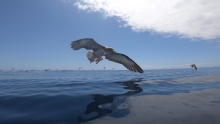Infectious diseases and respiratory infections in particular are a leading cause of global mortality. As such, there is an urgent need for rapid, large-scale diagnostic tools that can detect these diseases early, something which doesn’t currently exist. To address these problems, McGill University Professor of Bioengineering Sara Mahshid’s lab has developed an all-in-one detection platform (QolorEX) that can deliver test results in just 13 minutes.


The first human genome, which has served as the reference until now, was released approximately 20 years ago. It was a landmark accomplishment that had a huge impact on biomedical research and changed the way scientists study human biology. But it was based on just a few individuals and did not capture the full genetic diversity of the human population.

Sixty per cent of roughly 1,600 Canadians who took part in a new McGill University study say their lifestyle habits either stayed the same or improved during the COVID-19 pandemic. On the flip side, 40% of participants say they adopted less healthy lifestyle habits, including worsened eating habits, sleep quality, decreased physical activity and weight gain. The research is based on the Canadian COVIDiet study of Canadians between the ages of 18 to 89 years old. Researchers from McGill’s School of Human Nutrition collected data from across the country during the first wave of infections.

Earlier this month, a Japanese tourist in Montreal made her way to McGill University’s McLennan Library to view the ongoing exhibit taking place during Asian Heritage Month, “From Ukiyo-e to Woodblock Printmaking: A Celebration of Japanese Art.” Octavian Sopt, Senior Documentation Technician in the Rare Books and Special Collections branch, is part of the team responsible for exhibits at the library.

Recognizing that education on environmental justice must begin early, a group of McGill University Architecture students spent five weeks in two Grade 4 classes in Royal Vale Elementary School this year to run ARCHITECTURE PLAYSHOP, where children were introduced to architecture as part of their language, art, and science classes.

Though we all share common ancestors ranging from a few generations to hundreds of thousands of years, genealogies that relate all of us are often forgotten over time. A new McGill University-led study is now providing insight into the complex relationship between human migration and genetic variation, using a unique genealogical dataset of over five million records spanning 400 years to unravel the genetic structure of French Canadian populations.

Scientists have been worried about the potential harms of microplastics for years. These small plastic particles less than 5 mm in length have been found everywhere because of plastic pollution – from the Earth’s deep oceans to remote regions in Antarctica, and even the seafood we eat. But, are microplastics really harmful?

As part of this year’s Spring Convocation celebrations, McGill University will confer honorary degrees upon seventeen inspirational individuals.
Leaders in their respective fields, these honorary doctorates stand as examples of creativity, compassion, dedication, service, and a pioneering spirit. These are people who have made a difference in their community, in the world and – in the case of astronaut Drew Feustel – beyond.
May 30, 2023, 10 a.m.– Faculty of Medicine and Health Sciences, Doctor of Science, honoris causa (D.Sc.)
Amelia Tekwatonti McGregor


There is broad agreement that Homo sapiens originated in Africa. But there remain many uncertainties and competing theories about where, when, and how.

McGill researchers are exploring a new technique that uses 3D printing and hydrogels. It has the potential not only to improve biomedical implants but could also be useful in the development of human-machine interfaces such as touch screens and neural implants. Biomedical devices like pacemakers or blood pressure sensors that are implanted into the human body need to be fabricated in such a way that they conform and adhere to the body – and then dissolve at the right time.

For 21st century authors, the odds of writing a critical hit are much higher if the novel takes place in the past, not the present or future. Between 2000 and 2020, about three quarters of the novels shortlisted for the National Book Award, the Pulitzer Prize, and the National Book Critics Circle Award took place in the historical past.

The COVID-19 pandemic challenged any notion that Asian Americans are a privileged, white-adjacent group skirting above racism.

Phosphatases of regenerating liver (PRLs) are a family of enigmatic proteins involved in cell growth and metabolism present in various species. From humans to fruit flies, they play a unique role in the growth of cancerous tumours and the spread of cancer throughout the body. New research emerging from McGill University is contributing to what is known about PRLs, which could potentially become an important tool in the development of cancer-fighting treatments.

Surveying the body sizes of Earth’s living organisms, researchers from McGill University and University of British Columbia found that the planet’s biomass – the material that makes up all living organisms – is concentrated in organisms at either end of the size spectrum.
The researchers spent five years compiling and analyzing data about the size and biomass of every type of living organism on the planet—from tiny one-celled organisms like soil archaea and bacteria to large organisms like blue whales and sequoia trees.
